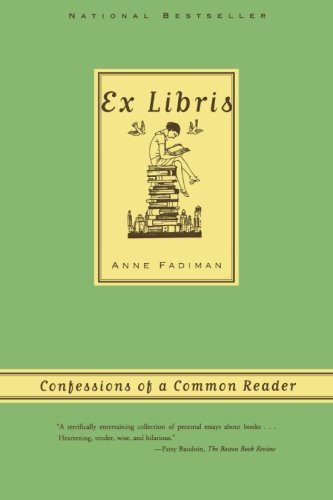What do you think?
Rate this book


162 pages, Paperback
First published October 1, 1998

Traduc cum mă pricep: „În ultimii 30 de ani, am înțeles că așa cum există mai multe chipuri de a iubi o persoană, la fel există mai multe chipuri de a iubi o carte. Îngrijitoarea / camerista (the chambermaid) credea în iubirea curtenească. Esența fizică a unei cărți (a book's physical self) era sacrosanctă pentru ea, forma cărții inseparabilă de conținut; datoria ei ca iubitoare a cărților era o adorare platonică, o încercare nobilă, dar și dureroasă de a păstra pentru totdeauna starea de perfectă castitate în care le primise de la librar... În schimb, familia Fadiman credea în iubirea carnală. Și pentru noi o carte era sfîntă, dar hîrtia, legătura, coperta, cleiul, cerneala care o alcătuiau erau doar un simplu purtător (vessel); deci, nu era nici un sacrilegiu să o tratezi așa cum îți dictau dorința și nevoile”.
پس از ۵ سال زندگی متاهلی و تولد اولین فرزندمان جورج و من بالاخره به این نتیجه رسیدیم که برای صمیمیت عمیقتر یعنی وصلت کتابخانههایمان آمادهایم.ص۲۳
همسرم کتابها را پخش و پلا میکند و انگار درست بشو هم نیست و هماتاقیش یک بار به او گفته بود «جورج اگر عطف یکی از کتابهای من را بشکنی میدانی که انگار کمر من را شکستهای.» ص۵۳
I have always preferred Keats to Wordsworth, but I was never able to put my finger on why until I read that Wordsworth, according to a visitor, "will live for a month on cold beef, and the next on cold bacon," whereas Keats once wrote his friend Charles Wentworth Dilke:
Talking of Pleasure, this moment I was writing with one hand, and with the other holding to my Mouth a Nectarine - good God how fine. It went down soft, pulpy, slushy, oozy - all its delicious embonpoint melted down my throat like a large Beatified strawberry.
I have never read two sexier sentences.
"Alas," wrote Henry Ward Beecher. "Where is human nature so weak as in the bookstore!" Mine is relatively strong at Barnes & Noble, because I know that if I resist a volume on one visit, and someone else buys it, an identical volume will pop up in its place like a plastic duck in a shooting gallery. And if I resist that one, there will be another day, another duck. In a secondhand bookstore, each volume is one-of-a-kind, neither replaceable from a publisher's warehouse nor visually identical to its original siblings, which have accreted individuality with every ownership. If I don't buy the book now, I may never have another chance. And therefore, like Beecher, who believed the temptations of drink were paltry compared with the temptations of books, I am weak.Meet Anne Fadiman, my new BFF. In these essays, originally published in Civilization magazine, Fadiman shares her love (and life) of books and the written word. In charming tales about vocabulary and grammar (and the obsessive need to fix errors of both), "Odd Shelves" and the odd titles found on them (in her case, a vast collection of books on polar exploration, and it's a good thing she didn't offer any titles because I would've had to add them all), challenges of combining one's library with a loved one's own, the many proper ways of handling a book (including using them as building blocks), as well as joys of reading aloud, reading about food, and reading books in the place they are about (the nearest I ever managed was reading George R. R. Martin's A Storm of Swords on a bus in Southern France), and more, Fadiman keeps pointing out that her love of books and reading vastly surpasses mine, but I'm not going to let that come between us. What are Bestest Friends for, if not to share and recommend good books? Now if only she'll return my calls. Anne? Anne? Where are you? We were supposed to go bookstore-browsing today. Anne? Are you there? Hello?
("Secondhand Prose," p. 150)